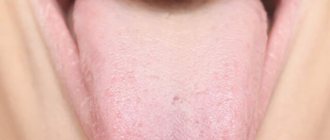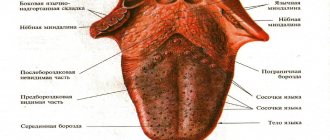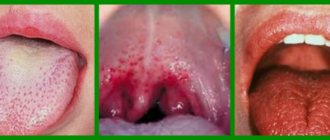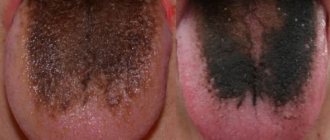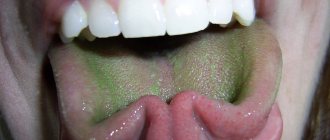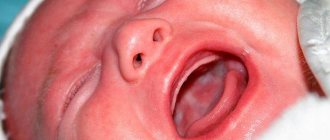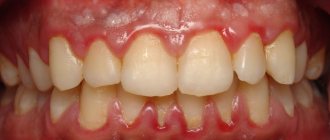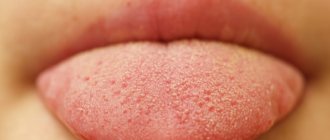If there is a sudden change in the usual appearance of the tongue, for example, when red dots or plaque appears on it, it is imperative to pay attention to this symptom, since this may be an indicator of a serious internal pathology. Many people have probably noticed that with certain diseases the nature of the surface and color of the tongue changes. This is true. This organ not only allows you to distinguish the taste of foods and talk, but also acts as a special indicator.
The tongue is normally pink in color; there may be a small amount of light coating on its root, while the rest of the surface is clean. You can also clearly see the taste buds in the form of mushroom-shaped outgrowths, and there is a clear groove in its center.
What does this mean?
The appearance of red dots on the tongue can be caused by a number of reasons, including those that do not threaten health and life. However, in some cases, such rashes indicate the appearance of a specific disease.
Red dots can have different origins:
- wound, petechiae - slight hemorrhage (with a burn of the tongue, for example);
- telangiectasia, that is, spider veins;
- ulcer;
- erosion;
- epithelial tumor of malignant and benign nature;
- rashes (macula, papule, roseola).
That is why it is of great importance to seek medical help in the case when a person finds red dots on the root of the tongue, as well as on other parts of this organ, in his child or himself.
Non-dangerous causes of appearance
The causes of red dots on the tongue that are not dangerous are:
- Eating foods colored red.
- Eating very hot or spicy food.
- Irritation or injury from wearing dentures.
- Changes in bite after visiting the dentist.
- Tongue burn.
- Allergic reaction to toothpaste and other oral hygiene products, food products.
- Smoking.
If none of the above explanations are found in a person, it is necessary to look for reasons of a more serious nature. The most common ones should be considered.
Why your tongue burns: the most common reasons
Fans of spicy food know firsthand how the tongue bakes.
As soon as spicy food touches your tongue, your taste buds instantly react to the pepper. Sometimes this condition is not associated with eating peppered foods. According to statistics, about 1% of people suffer from burning mouth syndrome. This is when the tongue and oral cavity “burn” for no apparent reason. Moreover, when carrying out diagnostic procedures, doctors often shrug their shoulders without understanding the cause of such a symptom.
The most plausible explanation for burning mouth syndrome is the theory of a pathological change in the nerve endings of the tongue. Most likely, the burning sensation on the tongue in this case is a consequence of a change in the polarization of nerve cells. For reasons that are still unclear, burning tongue and oral cavity syndrome occurs 5-7 times more often in women than in men.
In most cases, doctors are still able to determine the cause of this symptom. Let's look at the most common types of diseases and conditions that cause a burning tongue:
- Diseases of the teeth and oral cavity . The most obvious reason is dental pathologies. For example, these are gingivitis, periodontitis, advanced forms of caries and others. The causes of burning and soreness of the mucous membranes of the mouth and tongue are inflammation, which occurs against the background of infection or a non-infectious inflammatory process.
- Action of chemical and physical agents . Inflammatory processes in the oral cavity develop when exposed to chemical or physical aggressive agents. For example, this is gastric juice in gastroesophageal disease, stomach ulcers or vomiting. In this case, the acidic contents of the stomach are thrown into the esophagus and oral cavity, where it has an irritating effect. Some types of treatment, such as chemotherapy or radiation, also have a negative effect on the condition of the oral mucosa.
- Fungal infection of the mouth . A common reason for a burning tongue is a fungus. Typically, this is an infection with yeast-like fungi from the genus Candida. Accordingly, this disease is called candidiasis. It is popularly known as thrush. This name is due to the characteristic external manifestations, namely, a white cheesy coating on the tongue. It is noteworthy that candida are representatives of the normal human flora. A certain amount of these fungi is always found in the mucous membranes and skin. However, as soon as the immune system fails or the balance of microflora is disturbed (for example, when taking antibiotics), the fungus begins to multiply uncontrollably. This is how thrush occurs. In rare cases, oral candidiasis occurs without a white coating on the tongue, but a burning sensation is present.
- Stomatitis . Often a burning sensation of the tongue is observed with aphthous stomatitis. This is a type of stomatitis in which rounded aphthae (or pockets of erosion) form on the tongue. Such formations appear not only on the surface of the tongue, but also on the cheeks, palate and other parts of the oral cavity.
- Allergic reaction . A burning sensation on the tip of the tongue or other parts of it is sometimes triggered by an allergic reaction. Typically, this is a reaction to a food allergen. In this case, you should be especially careful with some exotic fruits. Often it is overseas fruits that become a source of allergens.
- Medicines . The instructions for some medications state in black and white that a burning sensation in the mouth is possible as a side effect. This effect often occurs with blood pressure medications, antidepressants, sedatives, and some antibiotics.
- Diabetes . It is known that high blood sugar levels have a toxic effect on the body. First of all, blood vessels suffer (angiopathy develops) and nerve fibers (neuropathies develop). Diabetic neuropathy sometimes affects the nerve endings of the tongue, resulting in a burning sensation, changes in taste, tingling or numbness. Accordingly, such symptoms are also possible in some neurological pathologies, for example, multiple sclerosis and others.
- Glossitis . A common cause of burning sensation or pain in the tongue is glossitis. These are inflammations of the tongue that occur due to infectious and non-infectious causes. Often the cause of this symptom is the so-called “geographical tongue” or migratory glossitis. In this case, the tongue becomes covered with spots, and its external outline resembles a map of the world.
- Deficiency of vitamins and minerals . A burning sensation in the mouth is also possible due to a lack of certain vitamins and minerals, in particular B vitamins, iron or folic acid. In this case, hypovitaminosis may be caused by various diseases that prevent biologically active substances from being absorbed in the small intestine. For example, this is celiac disease, a disease in which gluten intolerance is noted.
- Other diseases . Soreness and burning in the oral cavity is also possible with some other diseases - autoimmune disorders, scarlet fever, tumors and other pathologies.
Geographic language
Why do red dots appear?
Red dots on the tongue most often appear with stomatitis (inflammatory processes of the oral mucosa). There are quite a few direct causes of the development of stomatitis, but most often it is a viral infection, for example, of a herpetic nature.
Other factors also include pathogenic bacteria (streptococci, staphylococci), poor nutrition, fungi (for example, candidiasis), thermal or mechanical injuries, side effects of a number of medications, anemia, hormonal imbalance, decreased salivation, and dehydration.
The next common cause of red dots is allergies. It most often differs in food origin. You can suspect it when keeping a food diary. In this case, it is convenient to note the relationship between the appearance of a rash and the use of a specific product.
What are the reasons for red dots and white coating on the tongue? More on this below.
Associated symptoms
This symptom manifests itself in different ways. The tip of the tongue often burns, but sometimes the entire tongue or just the base burns. Often, with a burning sensation in the mouth, other accompanying symptoms are also noted. These include sore throat, dry mouth, difficulty swallowing, the appearance of white spots on the tongue, and others. The patient may also experience tingling, tingling, or rawness in the mouth. The nature of pain can be acute or chronic. If a symptom bothers you irregularly, then it is important to understand under what circumstances it develops. For example, if your tongue begins to burn whenever you eat pineapples, mangoes or other allergenic foods, then the cause is most likely food.
Mononucleosis
Rashes in the form of red dots on a child’s tongue may indicate the appearance of infectious mononucleosis, that is, an acute viral disease that is provoked by the Epstein-Barr virus.
Petechiae and telangiectasias on the surface of the tongue may indicate diseases of the circulatory system (thrombocytopathy, thrombocytopenia), vascular pathologies (vasculitis), liver diseases (organ failure, cirrhosis, hepatitis).
In some cases, a red dot on the surface of the tongue or under it is a symptom of quite rare diseases, for example, Kaposi's sarcoma, Kawasaki syndrome, tumors and pernicious anemia.
Red dots on the tongue and white coating
In some cases, the appearance of red dots is also accompanied by a yellowish or white coating, which is expressed to a certain extent. When it appears on the root of the tongue, the doctor will most likely discover intestinal or stomach pathologies in the patient. These may include, for example, chronic gastritis. In this case, the therapist will most likely refer the patient to a gastroenterologist.
A tongue covered with a white coating and red dots is often accompanied by bad breath. In this case, the cause could be her illness (for example, stomatitis) or diseases of the intestines and stomach. In some cases, the source of pathological signs is insufficient oral hygiene, so you need to brush your teeth on time and use rinses after meals.
What it is
The tongue, like any other human organ, is covered with a layer of epithelium, which has a different structure depending on where it is located.
The lower side of the tongue is smooth, the upper is rough, and there are small papillae on it, thanks to which a person distinguishes various tastes. A normal healthy tongue is pink, the surface of the papillae has a whitish-grayish tint. After eating, tiny particles of food can get stuck between the papillae, in which bacteria begin to multiply. It is food particles and bacterial waste products that form the basis of plaque, which usually forms on the tongue some time after eating. It can be of various densities and shades. For example, the tongue becomes coated after drinking black coffee or chocolate. It is easily removed using the hygienic procedure of brushing the teeth and tongue, and it does not appear in the future. But if plaque is difficult to remove and soon appears again, you need to pay close attention to your health. Let's try to figure out in more detail what this brown coating on the tongue is.
Pale tongue tone
Also, red dots on the tip of the tongue without plaque occur with anemia, but the organ itself turns pale, which is very easy to confuse with deposits. When detecting spots on the tongue, a person does not need to immediately worry and panic. First, you should observe your own condition and check whether such spots disappear within a few days. If there are no changes, even after adjusting the diet and the absence of bad habits, it is advisable to still go to see a doctor and take all the tests required to diagnose the disease, as well as undergo an examination.
How to remove
If a patient has a brown plaque, treatment should be aimed at eliminating the cause that causes it. First, you need to thoroughly clean your teeth, gums, inner surface of your cheeks and tongue from plaque using a toothbrush and toothpaste. Next, you should observe whether the plaque appears again and, if so, how quickly. And depending on the result obtained, whether or not to consult a doctor. If, after careful hygiene procedures, the plaque disappeared and did not appear again, then it was most likely the result of staining with food or medicine. In this case, there is no reason for alarm or treatment.
But if plaque appears again and again, is difficult to remove, and stays on the tongue for longer than five days, then this is a serious reason to consult a gastroenterologist, since a brown tongue primarily indicates problems with the gastrointestinal tract.
Rinsing the mouth with a decoction of chamomile or calendula flowers will help you deal directly with plaque. You can also chew a small piece of propolis for a few minutes; it has excellent bactericidal properties.
And remember: if the reason that caused the formation of a brown coating on the tongue is eliminated, it will disappear on its own without any measures within a few days. Therefore, you should fight the cause that causes it.
Features of treatment
Barring allergies, trauma and dyes, it is very important to treat permanent stains correctly. You need to go to an appointment with a dentist, who will treat, for example, glossitis, herpes, stomatitis, and identify benign formations in the oral cavity. If the disease is not dental, then he will refer you to a general practitioner, pediatrician, oncologist, cardiologist and gastroenterologist. Specialists may need additional examinations and tests. You cannot self-medicate.
These could be, for example, cancers that require long and serious treatment, as well as earlier diagnosis. Spots caused by pathologies of the gastrointestinal tract and hematopoietic system are treated only when the cause of their appearance is addressed. A hematologist or gastroenterologist can determine it after examination. This disease cannot be dealt with at home; it will only waste time. To get rid of pyogenic granuloma, specialists will prescribe surgery, cryodestruction or electrocoagulation. How else to treat red dots on the tongue?
They try to treat candidiasis on their own with decoctions, rinses, infusions and other folk remedies. Sometimes that's enough. However, most often you need to take antifungal agents internally, as well as immunomodulators and vitamins to strengthen the body as a whole.
Leukoplakia can be cured by dental treatment or elimination of foods with sharp edges from the diet. If the reddened part of the tongue is covered with keratinized grains, this indicates the beginning of a precancerous condition. In this case, you need to contact an oncologist. A “geographical” or “bald” tongue cannot be returned to its former state, since the taste buds and papillae cannot be restored. Allergic reactions in the form of redness occur in children and are difficult to treat if several new foods are introduced into the diet at the same time. Red food is a particular allergen.
Burning tongue: treatment methods
After diagnosing and establishing the cause of burning tongue, the doctor prescribes appropriate treatment. The extent of therapeutic intervention mainly depends on the underlying cause of the symptom. For this symptom, the following treatment options are used:
- Analgesic, symptomatic treatment . Anesthetic drugs are used for these purposes.
- Antibacterial therapy . Prescribed when a bacterial infection of the oral cavity is detected.
- Treatment at the dentist . The patient is given a set of therapeutic measures to eliminate caries, pulpitis, gingivitis, periodontitis and other dental diseases.
- Antifungal therapy . It is used for fungal infections of the oral cavity (candidiasis).
- Treatment of diabetes mellitus . Antihyperglycemic drugs are prescribed, as well as a special diet that limits the consumption of simple carbohydrates.
- Antiallergic treatment . Used for allergic reactions. The most effective way in this case is to avoid contact with the allergen. And to relieve an allergic reaction, antihistamines are used.
- Treatment of neurological and mental disorders . Depending on the root cause of the burning sensation in the mouth, the patient is prescribed antiepileptic drugs, antidepressants and other drugs that improve the functioning of the nervous system.
- Psychotherapy. Sometimes psychotherapy helps with this symptom. In particular, this works if the symptom is associated with increased stress levels or a mental health disorder.
- Other types of treatment . An individual treatment regimen is selected for each patient.
Home methods and traditional medicine
To treat this symptom, various traditional medicines are used that have a calming effect on the oral mucosa. Let's look at the most popular means:
- Rinsing with decoctions of medicinal plants . For these purposes, sage, chamomile flowers, aloe, linden flowers and other medicinal plants that have a calming effect are used.
- Rinsing the mouth with a salt solution . Salt has a mild anti-inflammatory and anti-edematous effect.
- Sucking ice cubes . This procedure will not only soothe the “burning” tongue, but also strengthen the throat.
To maintain oral health, it is important to drink enough fluids. This will avoid dry mouth and a number of problems that are associated with this circumstance (in particular, oral infections).
Prevention
To avoid the reappearance of small red dots on the tongue, you must carefully follow a number of recommendations:
- Eliminating bad habits.
- Scrupulous personal hygiene of the oral cavity, as well as good quality toothpaste and brushes.
- Review your diet and get rid of fast food products that are rich in hot spices.
- Carbonated drinks should not be consumed, especially if they contain a large number of dyes.
- Strengthening the immune system.
- Periodic visits to the doctor.
- It is recommended to harden children, carefully choose a diet, and also exclude the intake of any allergen.
